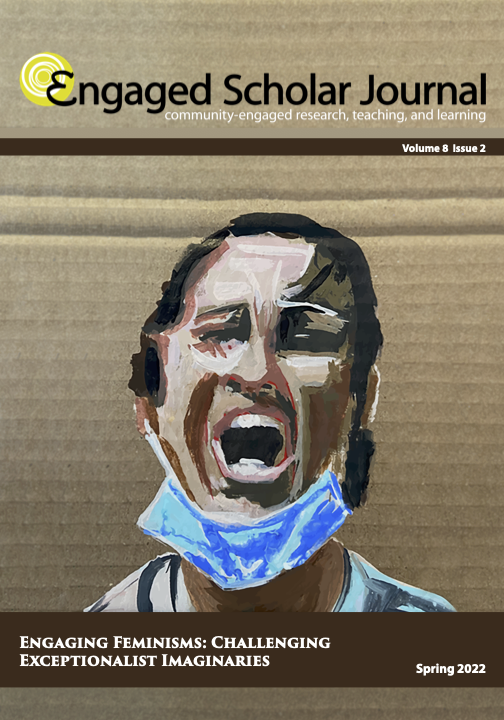Teaching and Learning Social Change
DOI:
https://doi.org/10.15402/esj.v8i2.70743Keywords:
social work education, community-engaged learning, social justice, community practiceAbstract
How can social work courses prepare students to be scholars of social movements, and also to act in solidarity with movements for social justice? How can graduate programs reimagine the professional socialization of social work students from aspiring for expertise toward a stance of life-long learning? How can instructors more deeply leverage our teaching practice to advance justice in our communities? This paper traces one attempt to answer these questions through a three-quarter graduate social work course designed to deepen students’ skills and knowledge in practices for social transformation, while amplifying existing social justice movements. Drawing on reflections from the instructor and five students, course artifacts, and insights from other students and community partners, this case study offers a model of community-engaged teaching that centers solidarity, reciprocity, and justice.
References
Bickford, D. M., & Reynolds, N. (2002). Activism and service-learning: Reframing volunteerism as acts of dissent. Pedagogy, 2(2), 229-252.
Center for Sustainable Economy. (2019). Crude bailout: How global partners’ and Zenith Energy’s oil terminals subvert democracy, endanger human life and health, and pollute the planet. Report. https://sustainable-economy.org/wp-content/uploads/2019/07/Crude-Bailout-report_July2019_f-4.pdf
Finn, J. L. (2016). Just practice: A social justice approach to social work. Oxford University Press.
George, P., Siver, S., & Preston, S. (2013). Reimagining field education in social work: The promise unveiled. Advances in Social Work, 14(2), 642-657.
Gray, M., & Webb, S. A. (2014). No issue, no politics: Towards a new left in social work education. In C. Noble, H. Strauss, & B. Littlechild (Eds.), Global social work: Crossing borders, blurring boundaries (pp. 327-338). Sydney University Press.
Gringeri, C. E., Wahab, S., & Anderson-Nathe, B. (2010). What makes it feminist?: Mapping the landscape of feminist social work research. Affilia, 25(4), 390-405.
Iverson, S., & James, J. (Eds.). (2014). Feminist community engagement: Achieving praxis. Springer.
Kivel, P. (2005). Social service or social change? In INCITE (Ed.), The revolution will not be funded: Beyond the non-profit industrial complex (pp. 129-149). South End Press.
Levine, A. S., & Murray-Lichtman, A. (2018). Integrating social justice in field education. Field Educator, 8(1), 1-7
Mehrotra, G. R., Tecle, A. S., Ha, A. T., Ghneim, S., & Gringeri, C. (2018). Challenges to bridging field and classroom instruction: Exploring field instructors’ perspectives on macro practice. Journal of Social Work Education, 54(1), 135-147.
Reisch, M. (2013). Social work education and the neo-liberal challenge: The US response to increasing global inequality. Social Work Education, 32(6), 715-733.
Rowe, A. C. (2005). Be longing: Toward a feminist politics of relation. NWSA Journal, 15-46.
Sheridan, M. P., & Jacobi, T. (2014). Critical feminist practice and campus-community partnerships: A review essay. Feminist Teacher, 24(1-2), 138-150.
Simons, H. (2014). Case study research: In-depth understanding in context. In P. Leavy (Ed.), The Oxford handbook of qualitative research (pp. 455-470). Oxford University Press.
Wayne, J., Bogo, M., & Raskin, M. (2010). Field education as the signature pedagogy of social work education. Journal of Social Work Education, 46(3), 327-339.
Published
How to Cite
Issue
Section
License
Authors who publish with this journal agree to the following terms:
- Authors retain copyright and grant the journal right of first publication with the work simultaneously licensed under a Creative Commons Attribution License CC BY 4.0 that allows others to share the work with an acknowledgement of the work's authorship and initial publication in this journal.
- Authors are able to enter separate, additional contractual agreements for the non-exclusive distribution of the journal's published version of the work (e.g., post it to an institutional repository or publish it in a book), with an acknowledgement of its initial publication in this journal.
- Authors are permitted to post their work online (e.g., in an institutional repository or on their website) after the publication of their work in the Engaged Scholar Journal.
- Please note that while every opportunity will be taken to ensure author participation in the editing process, due to time constraints final copyediting changes may be made before publication to ensure APA adherence throughout all submissions.




